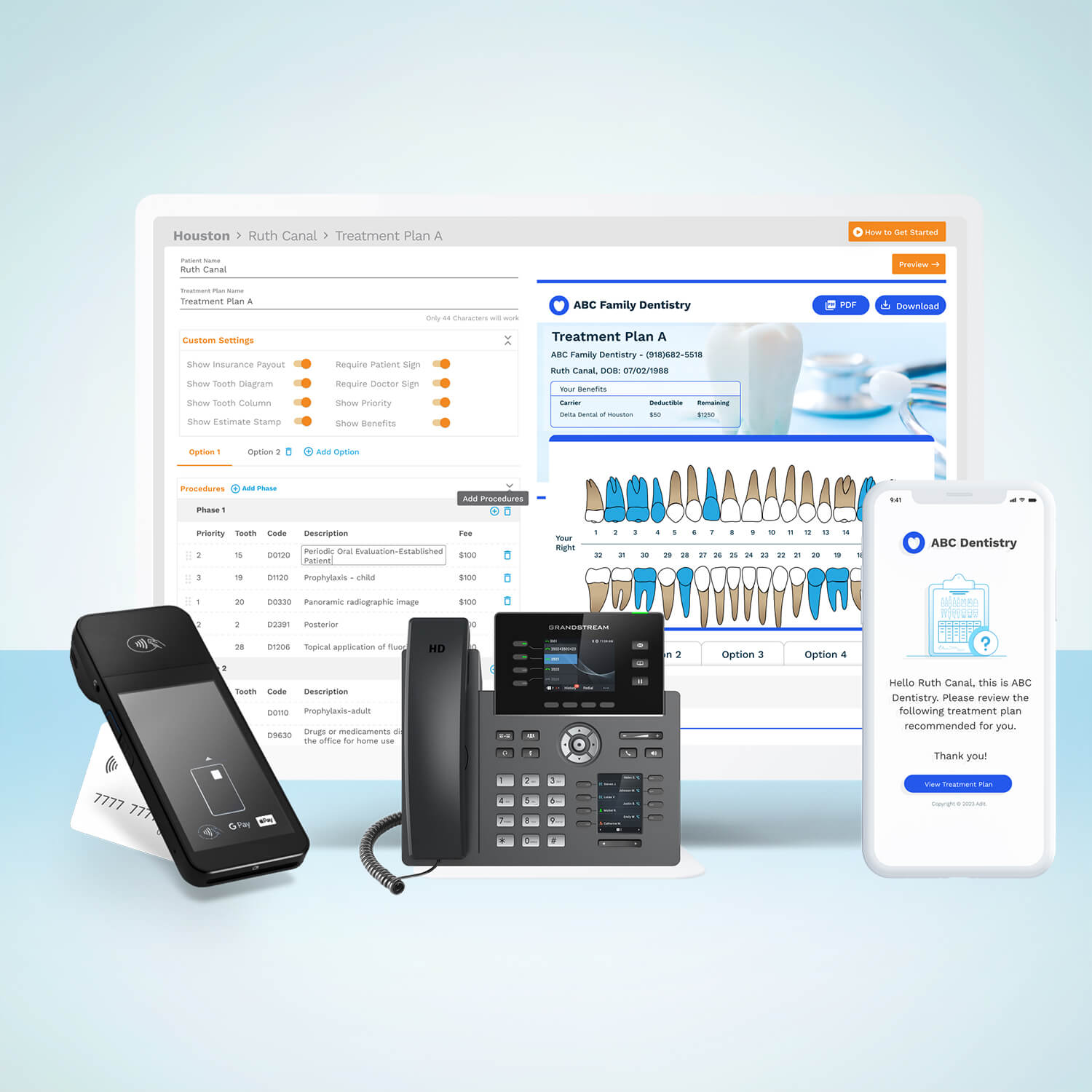Common Pitfalls In Treatment Planning And How To Avoid Them For Optimal Outcomes

When it comes to providing top-notch patient care, treatment planning is one of the most critical components of ensuring positive outcomes. However, as straightforward as it may seem, treatment planning can sometimes fall into a series of common pitfalls that can hinder progress and result in suboptimal care. Whether you are a dentist, medical professional, or healthcare provider, understanding and avoiding these missteps is crucial to delivering the best possible treatment.
At Adit, we understand that effective treatment planning isn’t just about creating a roadmap for care - it’s about fostering trust, communication, and long-term success for the patient. Let’s dive into some of the common pitfalls in treatment planning and how you can avoid them to enhance both the experience and outcomes for your patients.
1. Failing To Consider The Whole Patient

One of the common mistakes healthcare providers make is focussing solely on the condition or the issue at hand. While treating a specific issue, it's essential to look at the patients as a whole - consider their medical history, lifestyle factors, and even emotional well-being. Each of these plays a significant role in how they respond to treatment.
How to avoid it:
- Take a thorough patient history. At Adit, we encourage you to use our comprehensive software to capture every piece of information about your patient’s health. This ensures a holistic approach to treatment planning that covers everything from allergies to prior surgeries.
- Often, patients have concerns or questions that are vital to their treatment plan but may not always be voiced. Building a rapport can help uncover these hidden details.
- Collaborate with other healthcare professionals when necessary to ensure all aspects of the patient’s health are considered.
2. Overlooking Long-Term Consequences
A good treatment plan doesn’t just focus on immediate relief; it must also take into account long-term outcomes. Sometimes, in the rush to fix a problem quickly, healthcare providers may overlook the long-term effects of a treatment plan, leading to complications down the road.
How to avoid it:
- Help patients understand that certain treatments may require time, but they will yield lasting results.
- At Adit, we help practitioners design treatment plans that offer the flexibility to adapt to future needs, minimizing the risk of having to revisit treatments that could have been prevented.
- Ensure that the treatment plan includes preventative measures, such as follow-up appointments or lifestyle changes, to avoid future complications.
3. Lack of Patient Involvement

Treatment planning is not a one-way street. Patients need to feel involved and empowered in their own care. When patients are not engaged in the planning process, they may not fully understand or commit to the treatment plan, which can result in poor compliance and unsatisfactory outcomes.
How to avoid it:
- Take the time to explain why specific treatments are recommended and what the expected outcomes are.
- Platforms like Adit allow patients to track their treatment progress and stay connected with providers through easy communication channels, making them active participants in their care.
- Whenever possible, offer treatment alternatives that suit the patient’s preferences and lifestyle. When patients feel they have a say, they are more likely to stay committed.
4. Underestimating the Importance of Communication
Communication is the backbone of any successful treatment plan. Miscommunication or lack of communication can lead to misunderstandings, errors in treatment, and delayed outcomes. This is a critical pitfall that many healthcare providers overlook, and it can be especially harmful when managing complex cases.
How to avoid it:
- Make sure that both you and the patient have a clear understanding of the treatment plan, including timelines, procedures, and potential risks.
- At Adit, we encourage maintaining consistent and open communication through secure digital platforms. This not only ensures that patients are well-informed, but it also helps reduce the chance of miscommunication during the treatment process.
- Communication within your healthcare team is just as important as communication with the patient. Regular team meetings and updates ensure everyone is on the same page.
5. Failing to Account for Financial Barriers

Patients may be unable to fully adhere to a treatment plan due to financial constraints. This can be particularly true for dental treatments or elective procedures, where out-of-pocket costs can be a significant hurdle. As healthcare providers, we must consider these financial barriers when designing a treatment plan.
How to avoid it:
90 days after ditching Weave: AVA Dental gained 25% more patients with Adit Tired of tech that makes your job harder? AVA Dental was done with unreliable tools and support that never showed up when needed....
Download Case Study- Ensure that patients are fully aware of the costs involved and any potential additional expenses.
- Services like Adit’s can help patients manage treatment costs by offering payment plans, making treatment more accessible.
- When finances are limited, help patients prioritize necessary treatments that will have the most impact on their health. (Also read: https://adit.com/pricing)
6. Not Revisiting the Plan
A treatment plan isn’t set in stone. As treatment progresses, it’s important to revisit and revise the plan to accommodate any changes in the patient’s condition or response to treatment. Sticking rigidly to an outdated plan can lead to poor results and dissatisfaction.
How to avoid it:
- Schedule follow-up appointments to track progress and adjust the treatment plan as needed.
- Platforms like Adit allow you to track patient progress in real time, making it easier to adjust the plan as needed.
- Always be ready to pivot based on the patient’s feedback or changes in their condition.
7. Not Setting Clear, Measurable Goals
A treatment plan without clear goals is like a map without a destination. Without measurable objectives, it’s difficult to assess whether the plan is working or if changes need to be made. Goals also provide patients with something concrete to work toward, motivating them to stay engaged with the process.
How to avoid it:
- Ensure that each step of the treatment plan has a clear, tangible outcome, whether it’s a reduction in symptoms or improvement in function.
- With tools like Adit, you can set reminders for follow-ups, track patient milestones, and adjust goals based on progress.
A Holistic Approach to Treatment Planning

Ultimately, successful treatment planning is about balancing technical expertise with empathy and communication. At Adit, we believe that treatment plans should be flexible, patient-centered, and continuously evolving. By avoiding common pitfalls like neglecting patient involvement, failing to consider long-term outcomes, or ignoring financial concerns, you can create a plan that truly serves the patient and leads to optimal results.
By integrating modern tools, maintaining clear communication, and considering every aspect of a patient’s health and well-being, you can revolutionize the way you approach treatment planning—ensuring the best possible outcomes for your patients and building lasting, trusting relationships.
Remember, your treatment plan isn’t just about fixing a problem—it’s about partnering with your patients to help them achieve better health, one step at a time.
more about Adit?
Say goodbye to the hassle of using multiple tools. Adit centralizes your calls, texts, payments, reviews, and scheduling into one powerful dashboard. Simplify your operations and boost patient satisfaction today.
Schedule a DemoAngela is a former English teacher turned marketing content specialist. Over the past 10 years, she’s developed marketing strategies to forge enduring bonds between B2B, B2C and SaaS companies and their clients through holistic education, effective communication, and captivating storytelling that moves audiences to act.
Get a $25 Gift Card when you take a demo
Schedule a DemoGet a $50 Gift Card
when you take a demo
Looks like you're out of bounds!
Hey there! Your current location falls outside Adit's area of operation. If this is unexpected, try disabling your VPN and refresh your page. For further assistance or to book a live demo, connect with us at 832-225-8865.
March 3 Amazon Demo Promo
Terms and Conditions
Last Updated: March 3, 2026Offer ends March 6, 2026, and is limited to prospective customers who sign an annual agreement before March 31, 2026. Gift card will be emailed to the company owner or established representative within 4 weeks of signing the annual agreement. Offer may not be combined with any other offers and is limited to one (1) gift card per office. Offer is not available to current customers or to prospective customers or individuals that have participated in a Adit demo during the prior six (6) months. Recipient is responsible for all taxes and fees associated with receipt and/or use of the gift card as well as reporting the receipt of the gift card as required under applicable federal and state laws. Adit is not responsible for and will not replace the gift card if it is lost or damaged, is not used within any applicable timeframe, or is misused by the recipient. Adit is not responsible for any injury or damage to persons or property which may be caused, directly or indirectly, in whole or in part, from the recipient’s participation in the promotion or receipt or use of the gift card. Recipient agrees to indemnify, defend and hold harmless Adit from and against any and all claims, expenses, and liabilities (including reasonable attorney’s fees) arising out of or relating to a recipient’s participation in the promotion and/or recipient’s acceptance, use or misuse of the gift card. This offer is sponsored by Adit Communications, Inc. and is in no way sponsored, endorsed or administered by, or associated with Amazon.
Thank You!
We appreciate your interest! Adit AI will be calling you in the next few minutes!
Why Adit?
Cut your software bill by up to 60% when you merge everything your dental office needs to run under one roof.
Centralize Communications
- Phones & TeleMed
- Emails & eFax
- Texting & Reminders
- Call Tracking and more!
Streamline Operations
- Patient Forms
- Online Scheduling
- Payments
- Reviews and more!
Boost Production
- Performance Dashboards
- Morning Huddle
- Claims & Collections
- Patient Profiles
- Follow Up Lists
- Year Over Year Metrics
Acquire More Patients
- Digital Marketing
- Website Design
- SEO
- Google Ads
- Facebook Ads
when you sign up with Adit!
Sign up by filling out the form







